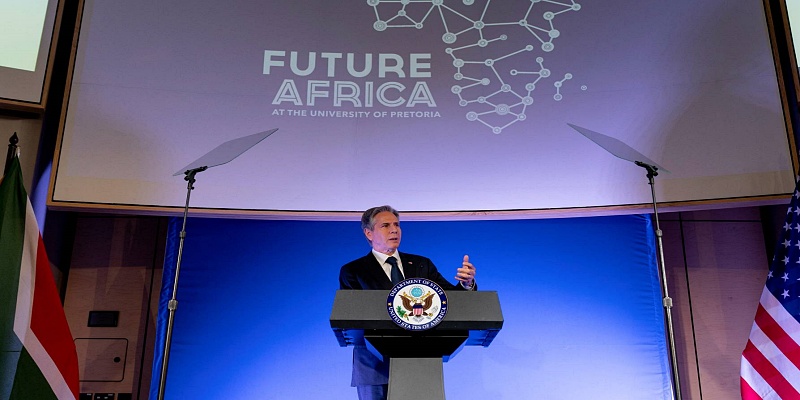Factsheet: US Strategy Toward Sub-Saharan Africa

Sub-Saharan Africa plays a critical role in advancing global priorities to the benefit of Africans and Americans.
It has one of the world’s fastest growing populations, largest free trade areas, most diverse ecosystems, and one of the largest regional voting groups in the United Nations (UN).
It is impossible to meet today’s defining challenges without African contributions and leadership.
The region will factor prominently in efforts to: end the COVID-19 pandemic; tackle the climate crisis; reverse the global tide of democratic backsliding; address global food insecurity; promote gender equity and equality; strengthen an open and stable international system; shape the rules of the world on vital issues like trade, cyber, and emerging technologies; and confront the threat of terrorism, conflict, and transnational crime.
Building on the Biden-Harris Administration’s actions and commitments to deepen our engagement and partnerships in Africa during the past year, the strategy articulates our new vision for a 21st Century U.S.-African Partnership.
It recognizes the tremendous, positive opportunities that exist to advance shared interests alongside our African partners. At the same time, we acknowledge that Africa’s potential will continue to be challenged as long as deadly conflicts divide societies, corruption impedes economic progress, food insecurity heightens the risk of famine and malnutrition, and repression stifles human rights and democratic expression.
As President Biden noted in his address to the African Union last year, “none of this is going to be easy but the United States stands ready now to be your partner, in solidarity, support, and mutual respect.”
The new U.S. Strategy Toward Sub-Saharan Africa represents a reframing of Africa’s importance to U.S. national security interests. We will pursue four main objectives in sub-Saharan Africa:
1. FOSTER OPENNESS AND OPEN SOCIETIES
The United States has an abiding interest in ensuring the region remains open and accessible to all and that governments and publics are able to make their own political choices, consistent with international obligations. Open societies are generally more inclined to work in common cause with the United States, attract greater U.S. trade and investment, pursue policies to improve conditions for their citizens, and counter harmful activities by the People’s Republic of China, Russia, and other actors. We will foster openness and open societies, including by:
- Promoting government transparency and accountability
- Increasing our focus on rule of law, justice, and dignity
- Assisting African countries to more transparently leverage their natural resources for sustainable development
2. DELIVER DEMOCRATIC AND SECURITY DIVIDENDS
The region’s commitment and capacity to renew its democracies, as well as anticipate, prevent, and address emerging and long running conflicts, can lead to more favorable outcomes for Africans and Americans. By simultaneously addressing these challenges and reaffirming that democracy delivers tangible benefits, the United States can offer positive choices to Africans as they determine their own future. We will help Africa deliver democratic and security dividends, including by:
- Working with allies and regional partners to stem the recent tide of authoritarianism and military takeovers
- Backing civil society, empowering marginalized groups, centering the voices of women and youth, and defending free and fair elections
- Improving the capacity of African partners to advance regional stability and security
- Reducing the threat from terrorist groups to the U.S. Homeland, persons, and diplomatic and military facilities
3. ADVANCE PANDEMIC RECOVERY AND ECONOMIC OPPORTUNITY
It is essential to address two of the region’s most pressing problems: the COVID-19 pandemic and its attendant economic and social consequences. These challenges have been compounded by supply chain problems and food insecurity stemming from Russia’s war of aggression in Ukraine. The United States is committed to working with regional governments and international partners to build more stable and inclusive African economies. We will advance pandemic recovery and economic opportunity, including by:
- Prioritizing policies and programs to end the acute phase of the COVID-19 pandemic and build capacities to increase preparedness for the next health threat
- Supporting manufacturing initiatives for vaccines and other medical countermeasures
- Promoting a stronger growth trajectory and debt sustainability to support the region’s economic recovery, including through the Partnership for Global Infrastructure and Investment (PGII), Prosper Africa, Power Africa, Feed the Future, and a new initiative for digital transformation
- Partnering with African countries to rebuild human capital and food systems that were further weakened by the pandemic and Russia’s war against Ukraine
4. SUPPORT CONSERVATION, CLIMATE ADAPTATION, AND A JUST ENERGY TRANSITION
Africa’s efforts to conserve and restore the continent’s ecosystems and rich natural resources— while also realizing energy access and energy security goals, diversifying its energy mix, and building sustainable supply chains—are central to tackling the global climate crisis. Although the region is responsible for extremely low emissions per capita, it stands to suffer from some of the most severe effects of climate change. We will support conservation, climate adaptation, and a just energy transition, including by:
- Partnering with governments, civil society, and local communities to conserve, manage, and restore the continent’s rich natural ecosystems
- Supporting countries in their efforts to minimize and adapt to the impacts of a changing climate, including enhancing community, economic, and supply chain resilience
- Working closely with countries to accelerate their just transitions to a clean energy future, energy access, and energy security
- Pursuing public-private partnerships to sustainably develop and secure the critical minerals that will supply clean energy technologies
Source: The White House
